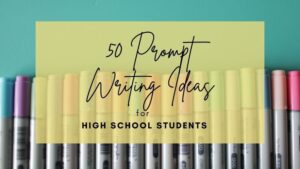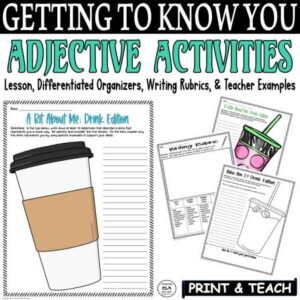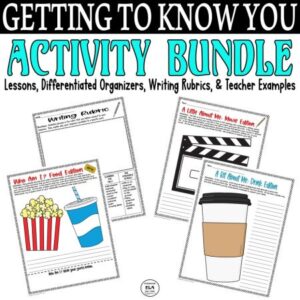When it comes to teaching about adjectives, knowing the parts of speech is key. I don’t know about you, but when I was growing up, grammar was a very important part of the curriculum. We had whole books dedicated to learning about the structure of the English language. Well, I would argue that nowadays, a focus on grammar has taken a backseat to teaching reading comprehension and formulaic writing.
And I TOTALLY get it. Jobs are on the line. If students don’t show growth on a yearly reading and writing standardized test, then teachers are held more accountable than ANYONE.
So let’s breathe…and start to integrate teaching about adjectives into what we are already doing in reading and writing instruction!
Continue reading below for 5 Painless Steps For Teaching About Adjectives!!
Need help with Test Prep? Check out this FREE Pack of 3 Test Prep Activities to help students achieve success on standardized tests!

5 Painless Steps For Teaching About Adjectives
1. Teach about Nouns before Teaching about Adjectives
Yup. I am advocating the teaching of specific parts of speech. And just like you can’t teach adverbs without knowing what a verb is, you can’t really teach adjectives without knowing what a noun is.
NOUN-
- person
- place
- thing
- idea
Let’s examine “Roller Skating,” a narrative by Kristin Menke:
Every Monday and Friday mornings, we filed into ancient army green and ocean blue vans and school buses, pockets filled with dollars and coins to spend at the local rink in downtown Fort Lauderdale. I can still smell the berry bubble gum, a musty perfume from days spent at the lake, and years of child sweat embedded into the pleather seats. Even in South Florida, air conditioning did not exist for the summer camp child. It’s not that we didn’t notice; it’s that we didn’t care. Summer embeds itself into you primarily through the skin, and somehow, we knew it was a necessary part of every journey.
NOUNS-
Ex. mornings, vans, buses, pockets, dollars, coins, rink, Fort Lauderdale, bubble gum, perfume, days, lake, years, sweat, seats, South Florida, air conditioning, child, Summer, skin, part, journey
If students can understand and then identify nouns in whatever reading passage, speech, short story, poem, novel excerpt, etc. you are reading, it will make the process of teaching about adjectives MUCH simpler!
2. Define Adjectives & Offer Examples
DEFINE ADJECTIVE-
An adjective is a word that describes a noun (person, place, thing, idea).
REVIEW NOUNS-
- person- Ex. lady
- place- Ex. park
- thing- Ex. language
- idea- Ex. love
OFFER EXAMPLES-
Here are some adjective and noun combinations:
Ex. tall lady, beautiful park, happy day, colorful language, incredible love
You will definitely want students to write down these examples before they start identifying them within texts; modeling here is key!
Thought about teaching poetry soon? Check out this post about the Powerful Poetry of Edgar Allan Poe!
3. Identify Examples in Texts
Now, let’s go back to Kristin Menke’s “Roller Skating:”
Every Monday and Friday mornings, we filed into ancient army green and ocean blue vans and school buses, pockets filled with dollars and coins to spend at the local rink in downtown Fort Lauderdale. I can still smell the berry bubble gum, a musty perfume from days spent at the lake, and years of child sweat embedded into the pleather seats. Even in South Florida, air conditioning did not exist for the summer camp child. It’s not that we didn’t notice; it’s that we didn’t care. Summer embeds itself into you primarily through the skin, and somehow, we knew it was a necessary part of every journey.
ADJECTIVES-
Ex. Monday, Friday, ancient, army green, ocean blue, school, local, downtown, berry, musty, child, pleather, summer camp, necessary, every
***Remember that the words themselves don’t necessarily make them adjectives; it is HOW they are used in a sentence.
Ex. color blue versus a blue object
Here is another excerpt from “Hardware,” another narrative by Kristin Menke:
My dad owned a hardware store for almost fifteen years, making up much of my childhood, so my perspective is a bit different from those who stroll the aisles of a wholesale chain hardware store. His store, “Bishop’s Handy Hardware,” personified the American Dream. He worked hard; we worked hard. My father, a military veteran and jack of all trades, entered into this business after years of working for another building supply company. Now let me tell you: my dad can pretty much rig, fix, amend, alter, or transform anything.
It’s his gift, that and the ability to talk to anyone, anywhere, anytime. Just ask the customers he waits in line with at the big box or grocery stores. Right at the moment when you think you can mindlessly float through Facebook or Instagram feeds; he springs upon you with the readiness of a child about to open a chocolate bar. My dad simply savors conversation; it’s what has made him successful. He connects with people, and his love for fixing things extends beyond a mere mechanical or construction issue. He wants to solve all of the problems of the world, both inside and outside of the hardware store.
Ex. hardware, fifteen, different, wholesale, chain, American, military, building, supply, big box, grocery, Facebook, Instagram, chocolate, successful, mechanical, construction
Want READY-MADE reading test prep lessons for this narrative? Click HERE!
4. Create Adjectives/Noun Combos in a Short Practice Activity
Provide nouns or have students come up with 1-2 examples for each type of noun. Model what you want as you start teaching about adjectives by using teacher samples.
Here are examples:
Person- ______ student
Place- ______ school
Thing- ______ backpack
Idea- ______ education
Teacher Ideas: intelligent student / busy school / enormous backpack / well-rounded education
If you really want to spice things up as you continue teaching about adjectives, encourage students to get creative with their responses and give students time to share out in the whole class, small groups, or pairs!
Click below for this post that contains 50 FUN Writing Prompt Ideas!
5. Practice with Student Writing
Ultimately, we want students to use what they know about adjectives in their own writing. Adjectives help readers to see what the author wants them to see vividly and personally, so they can understand the important events and overall theme of the text!
PRACTICE ACTIVITIES FOR TEACHING ABOUT ADJECTIVES-
- Grab an older piece of student work and ask students to add several adjectives to their own writing.
- Practice changing out adjectives for their antonyms for a poem like “Annabel Lee.” The meaning will definitely change, which is fun!
- Write a descriptive paragraph about a place you want to visit and utilize at least 5 adjectives, but don’t say the exact name of the place. Students can then guess based on the description!
Here is a lesson pack for teaching about adjectives from this FUN Getting To Know You Activity Pack!
Directions: In the cup below, write down at least 5 adjectives that describe a drink that represents you in some way. Be specific and consider the five senses. On the lines, explain why this drink represents you by using specific examples to support your ideas.
Remember, teaching about adjectives doesn’t have to be super serious or formulaic. Engagement is vital!
CLICK BELOW TO GET READYMADE RESOURCES FOR TEACHING ABOUT ADJECTIVES!!
Want more ideas for teaching about adjectives? Check out my store Kristin Menke-Integrated ELA Test Prep!






